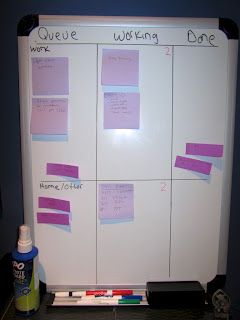I set it up last Friday afternoon. It was a good way to wrap up the week and make sure I wasn't forgetting any tasks that had to get done before I called it a day. It also worked well when I walked in my office on Monday morning - a quick, visual reminder of what I have going on.
Here's how I set things up;
- I have two swim lanes, one for work, the other for home/other projects (such as volunteer work). Within each, I set a limit of 2 items for work in progress. We'll see how well that works in a couple weeks when I'm running 2 different projects.
- I use small stickies for tasks that are small, around a couple hours or less. I have big notes for more involved work. On these, I jotted down important details. For example, the task to prepare for my presentation at PMI has key dates I have to meet.
- I'm going to keep things in "done" throughout the week and use this to help me do my timesheet at the end of the week.
- I am still keeping a "To-Do" list of short, quick things I have to do. I haven't made up my mind on the best way to handle these items.

I haven't figured out what I'm going to do when I'm traveling. I think I'm going to use a notebook to capture what I have to do when traveling and write things down that have to go on the board when I get home. Stay tuned for updates.